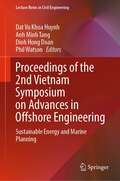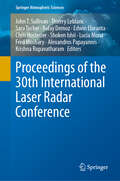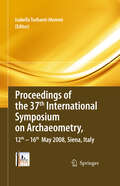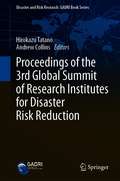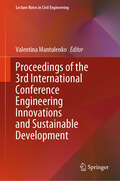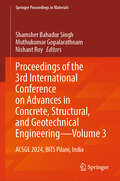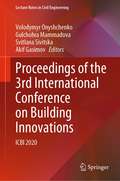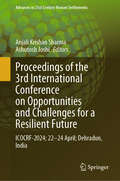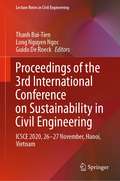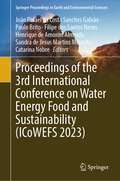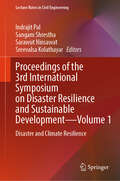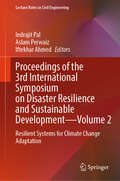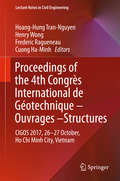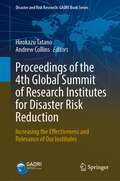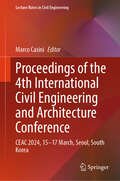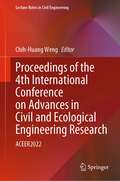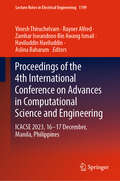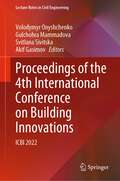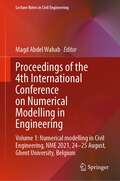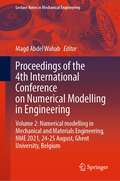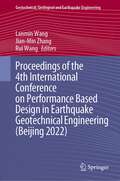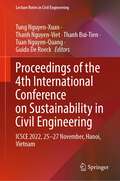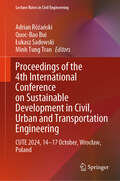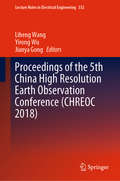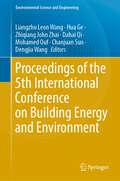- Table View
- List View
Proceedings of the 2nd Vietnam Symposium on Advances in Offshore Engineering: Sustainable Energy and Marine Planning (Lecture Notes in Civil Engineering #208)
by Dinh Hong Doan Anh Minh Tang Dat Vu Khoa Huynh Phil WatsonThis book gathers a selection of refereed papers presented at the 2nd Vietnam Symposium on Advances in Offshore Engineering (VSOE 2021), held in 2022 in Ho Chi Minh City, Vietnam. The book consists of articles written by researchers, practitioners, policymakers, and entrepreneurs addressing the important topic of technological and policy changes intended to promote renewable energies and to generate business opportunities in oil and gas and offshore renewable energy. With a special focus on sustainable energy and marine planning, the book brings together the latest lessons learned in offshore engineering, technological innovations, cost-effective and safer foundations and structural solutions, environmental protection, hazards, vulnerability, and risk management. Its content caters to graduate students, researchers, and industrial practitioners working in the fields of offshore engineering and renewable energies.
Proceedings of the 30th International Laser Radar Conference (Springer Atmospheric Sciences)
by Sara Tucker John T. Sullivan Thierry Leblanc Belay Demoz Edwin Eloranta Chris Hostetler Shoken Ishii Lucia Mona Fred Moshary Alexandros Papayannis Krishna RupavatharamThis volume presents papers from the biennial International Laser Radar Conference (ILRC), the world’s leading event in the field of atmospheric research using lidar. With growing environmental concerns to address such as air quality deterioration, stratospheric ozone depletion, extreme weather events, and changing climate, the lidar technique has never been as critical as it is today to monitor, alert, and help solve current and emerging problems of this century. The 30th occurrence of the ILRC unveils many of the newest results and discoveries in atmospheric science and laser remote sensing technology. The 30th ILRC conference program included all contemporary ILRC themes, leveraging on both the past events’ legacy and the latest advances in lidar technologies and scientific discoveries, with participation by young scientists particularly encouraged. This proceedings volume includes a compilation of cutting-edge research on the following themes: new lidar techniques and methodologies; measurement of clouds and aerosol properties; atmospheric temperature, wind, turbulence, and waves; atmospheric boundary layer processes and their role in air quality and climate; greenhouse gases, tracers, and transport in the free troposphere and above; the upper mesosphere and lower thermosphere; synergistic use of multiple instruments and techniques, networks and campaigns; model validation and data assimilation using lidar measurements; space-borne lidar missions, instruments and science; ocean lidar instrumentation, techniques, and retrievals; and past, present and future synergy of heterodyne and direct detection lidar applications. In addition, special sessions celebrated 50 years of lidar atmospheric observations since the first ILRC, comprising review talks followed by a plenary discussion on anticipated future directions.
Proceedings of the 37th International Symposium on Archaeometry, 13th - 16th May 2008, Siena, Italy
by Isabella Turbanti-MemmiThe book contains the Proceedings of the 37th International Symposium on Archaeometry, 12th May 2008, Siena, Italy. The aim of the Symposium is to promote the development and use of scientific techniques in order to extract archaeological and historical information from cultural heritage and the paleoenvironment. It involves all Natural Sciences and all types of objects and materials related with human activity. Papers deal with the development and/or application of scientific techniques for extracting information related to human activities of the past, including the biological nature of man himself and the environment in which he lived. Topics include: Field Archaeology and Intergrated Site Studies; Archaeo-chronometry including recent developments in Radiocarbon Dating; Human - Environment Interactions including Geoarchaeology, Palaeoclimate studies, Landscape Archaeology, Environmental reconstructions, etc.; Bioarchaeology; Food preparation and consumption in Antiquity; the Technology and Provenance of Stone, Plaster, Pigments;Ceramics, Glazes, Glass and Vitreous Materials, Metals and Metallurgical Ceramics; and Micro/nano diagnostic techniques.
Proceedings of the 3rd Global Summit of Research Institutes for Disaster Risk Reduction (Disaster and Risk Research: GADRI Book Series)
by Andrew Collins Hirokazu TatanoThis book presents selected papers from the 3rd Global Summit of Research Institutes for Disaster Risk Reduction – Expanding the Platform for Bridging Science and Policy Making, which was held at the Disaster Prevention Research Institute (DPRI), Kyoto University, Uji Campus from 19 to 21 March 2017. It was organised by the Global Alliance of Disaster Research Institutes (GADRI), which was established soon after the second Global Summit and the UN World Conference on Disaster Risk Reduction in March 2015, and is intended to support the implementation of the Sendai Framework for Disaster Risk Reduction 2015–2030.The conference not only provided a platform for discussion and exchange of information on key current and future research projects on disaster risk reduction and management, but also promoted active dialogues through group discussion sessions that addressed various disaster research disciplines.In this book, authors from various disciplines working at governmental and international organisations provide guidance to the science and technical community, discuss the current challenges, and evaluate the research needs and gaps in the context of climate change, sustainable development goals and other interlinked global disaster situations. Expert opinions from practitioners and researchers provide valuable insights into how to connect and engage in collaborative research with the international science and technical communities and other stakeholders to achieve the goals set out in the agenda of the Sendai Framework for Disaster Risk Reduction 2015–2030. In addition, case studies and other evidence-based research papers highlight ongoing research projects and reflect the challenges encountered in information sharing by various stakeholders in the context of disaster risk reduction and management.Chapter “Science and technology commitment to the implementation of the Sendai Framework for Disaster Risk Reduction 2015-2030” is available open access under a Creative Commons Attribution 4.0 International License via link.springer.com.
Proceedings of the 3rd International Conference Engineering Innovations and Sustainable Development (Lecture Notes in Civil Engineering #540)
by Valentina MantulenkoThis book presents the contributions from the 3rd International Conference Engineering Innovations and Sustainable Development, held in Samara, Russia on April 26, 2024. By presenting international research on various sustainability issues, it includes topics such as current trends in industrial and agricultural development, innovations in the construction and transport sectors, problems concerning the financing of innovative activities and governmental support for innovations, and engineering competences and skills in the era of new technologies. It also covers the economic, environmental, and informational aspects of sustainable development in the context of innovations. Finally, the book addresses theoretical and practical aspects by studying the phenomenon of sustainability and engineering development in terms of comparing international experiences. It provides significant value for scientists, teachers, and students of higher educational institutions, and specialists, who are researching sustainable development issues in the era of engineering innovations.
Proceedings of the 3rd International Conference on Advances in Concrete, Structural, and Geotechnical Engineering—Volume 3: ACSGE 2024, BITS Pilani, India (Springer Proceedings in Materials #31)
by Shamsher Bahadur Singh Muthukumar Gopalarathnam Nishant RoyThis book consists of selected papers presented at the 3rd International Conference on Advances in Concrete, Structural, and Geotechnical Engineering (ACSGE 2024) held at BITS, Pilani, India. The papers represent the latest research work in the fields of advanced composite materials, advanced computational techniques for structures, applications of nanotechnology in civil engineering, bridge engineering, composite structures, concrete technology, the fatigue life of structures, fire-resistant structures, functionally graded materials and structures, geotechnical processes, ground improvement techniques, offshore structures, performance-based design of structures, pre-cast pre-stressed concrete structures, seismic design, and construction, soil structure interaction, structural health assessment and rehabilitation, sustainability of construction, design, and management. The papers are presented by an international pool of academics, research scientists, and industrial experts and therefore cater to the global audience from the fields of construction materials, design guidelines, geotechnical engineering, concrete infrastructures, and structural engineering. This book is part of a 3-volume series of these conference proceedings, and it represents Volume 3 in the series.
Proceedings of the 3rd International Conference on Building Innovations: ICBI 2020 (Lecture Notes in Civil Engineering #181)
by Volodymyr Onyshchenko Gulchohra Mammadova Svitlana Sivitska Akif GasimovThis book gathers the latest advances, innovations, and applications in the field of building design and construction, by focusing on new design solutions for buildings and new technologies creation for construction, as presented by researchers and engineers at the 3rd International Conference Building Innovations (ICBI), held in Poltava – Baku, Ukraine – Azerbaijan, on June 1-2, 2020. It covers highly diverse topics, including structures operation, repairing and thermal modernization in existing buildings and urban planning features, machines and mechanisms for construction, as well as efficient economy and energy conservation issues in construction. The contributions, which were selected by means of a rigorous international peer-review process, highlight numerous exciting ideas that will spur novel research directions and foster multidisciplinary collaborations.
Proceedings of the 3rd International Conference on Opportunities and Challenges for a Resilient Future: ICOCRF-2024; 22–24 April; Dehradun, India (Advances in 21st Century Human Settlements)
by Anjali Krishan Sharma Ashutosh JoshiThis book presents peer-reviewed articles from the 3rd International Conference on Opportunities and Challenges for a Resilient Future (ICOCRF 2024) held at Dehradun, India. In recent times, the world has faced unprecedented challenges affecting its inhabitants adversely. Natural disasters, climate change, and pandemic have affected public health and food securities causing economic and social disruption that has placed millions of livelihoods at great risk. It is the need of the hour to strategize and mitigate these challenges and provide solutions for the consequences of these calamities and to align with SDG goals in delivering a meaningful progress for people and the world by creating a brighter future for all. In alignment with the recent emergencies faced by global communities and sustainable development goals, this book brings with it the relevant dialogues to address the above.
Proceedings of the 3rd International Conference on Sustainability in Civil Engineering: ICSCE 2020, 26-27 November, Hanoi, Vietnam (Lecture Notes in Civil Engineering #145)
by Thanh Bui-Tien Long Nguyen Ngoc Guido De RoeckThis book contains the proceedings of the 3rd International Conference on Sustainability in Civil Engineering, ICSCE 2020, held on 26–27 November 2020, in Hanoi, Vietnam. It presents the expertise of scientists and engineers in academia and industry in the field of bridge and highway engineering, construction materials, environmental engineering, engineering in industry 4.0, geotechnical engineering, structural damage detection and health monitoring, structural engineering, geographic information system engineering, traffic, transportation and logistics engineering, water resources, estuary and coastal engineering.
Proceedings of the 3rd International Conference on Water Energy Food and Sustainability (Springer Proceedings in Earth and Environmental Sciences)
by João Rafael da Costa Sanches Galvão Filipe dos Santos Neves Henrique de Amorim Almeida Sandra de Jesus Martins Mourato Paulo Brito Catarina NobreThis book presents some of the work presented at the 3rd International Conference on Water Energy Food and Sustainability—ICoWEFS 2023, with topics delving into critical global themes. Encompassing four pivotal domains—Water and Circular Economy, Energy, Agrifood, and Sustainability—this book covers cutting-edge research and innovative solutions. Within the ambit of Water and Circular Economy, the discussions span from the sustainable management of water resources, urban and industrial water consumption, to the challenges in governance and the impact of climate change. The Energy section covers chapters on energy production, urban and industrial systems, governance challenges, and the imperative transition toward circular economies. The Agrifood domain probes into sustainable agricultural practices, harnessing smart technologies in farming, climate change's effect on food production, and innovations in food processing. Lastly, the Sustainability segment encompasses a wide array of topics including bioeconomy sustainability, cyber-physical systems, climate change impacts, and resource efficiency, underpinning the urgent need for a holistic approach to global sustainability.
Proceedings of the 3rd International Symposium on Disaster Resilience and Sustainable Development—Volume 1: Disaster and Climate Resilience (Lecture Notes in Civil Engineering #623)
by Sangam Shrestha Indrajit Pal Sreevalsa Kolathayar Sarawut NinsawatThis book presents selected papers from the 3rd International Symposium on Disaster Resilience and Sustainable Development, organized by the Disaster Preparedness, Mitigation and Management Program of the Asian Institute of Technology, Thailand, in collaboration with academic institutions and organizations across the world. It assembles a compendium of research contributions addressing crucial topics at the nexus of science, technology, climate change, multiple hazards, and measures for fortifying resilience. This book delves into a comprehensive understanding encompassing a range of disaster management facets, including earthquakes, flooding, tropical cyclones, and the cross-disciplinary technologies devised to mitigate these catastrophes. These subjects are extensively explored within the various technical papers presented in this volume. The contents of this compilation encapsulate research findings and case studies that spotlight recent strides in the realm of disaster risk science and technology. By addressing multifaceted challenges, these contributions underscore the pursuit of sustainability and lasting resilience. The content caters to research scholars, students, industry professionals, data analytics companies, re-insurance companies, government bodies, and policymakers, who work in the field of hazard modeling and disaster management. This book represents Volume 1 of a three-volume book series.
Proceedings of the 3rd International Symposium on Disaster Resilience and Sustainable Development—Volume 2: Resilient Systems for Climate Change Adaptation (Lecture Notes in Civil Engineering #624)
by Indrajit Pal Iftekhar Ahmed Aslam PerwaizThis book presents selected papers from the 3rd International Symposium on Disaster Resilience and Sustainable Development, organized by the Disaster Preparedness, Mitigation, and Management Program of the Asian Institute of Technology, Thailand, in collaboration with academic institutions and organizations across the world. The symposium converges research contributions that address critical themes within the realm of science, technology, climate change, assorted hazards, and strategies for bolstering resilience. The book contains research outcomes and case studies on multi-hazard risk and resilience and sustainability of the diverse systems that constitute our society, to propagate an integral foundation for sustainable development and effective climate change adaptation, enabling societies to thrive and endure in the face of an increasingly dynamic and uncertain world. The content caters to research scholars, students, industry professionals, data analytics companies, re-insurance companies, government bodies, and policymakers, who work in the field of hazard modeling and disaster management. This book represents Volume 2 of a three-volume book series.
Proceedings of the 4th Congrès International de Géotechnique - Ouvrages -Structures
by Henry Wong Hoang-Hung Tran-Nguyen Frederic Ragueneau Cuong Ha-MinhThis proceedings volume for the 4th international conference CIGOS 2017 (Congrès International de Géotechnique - Ouvrages - Structures) presents novel technologies, solutions and research advances, making it an excellent guide in civil engineering for researchers, students, and professional engineers alike. Since 2010, CIGOS has become a vital forum for international scientific exchange on civil engineering. It aims to promote beneficial economic partnerships and technology exchanges between enterprises, worldwide institutions and universities. Following the success of the last three CIGOS conferences (2010, 2013 and 2015), the 4th conference was held at Ho Chi Minh City University of Technology, Ho Chi Minh City (Saigon), Vietnam on 26 to 27 October 2017. The main scientific themes of CIGOS 2017 were focused on ‘New Challenges in Civil Engineering’.
Proceedings of the 4th Global Summit of Research Institutes for Disaster Risk Reduction: Increasing the Effectiveness and Relevance of Our Institutes (Disaster and Risk Research: GADRI Book Series)
by Andrew Collins Hirokazu TatanoThis book presents selected papers by the keynote speakers and other presenters from various disciplines and includes their opinions and evaluations. The Fourth Global Summit of Research Institutes for Disaster Risk Reduction (4th GSRIDRR, 2019): Increasing the Effectiveness and Relevance of our Institutes, sponsored by the Global Alliance of Disaster Research Institutes (GADRI) and Kyoto University, was hosted by and held at the Disaster Prevention Research Institute (DPRI), Kyoto University, Uji Campus, Kyoto, Japan, 13–15 March 2019..The Global Summit series provided a platform for researchers, practitioners, policy makers, and other stakeholders in both government and non-governmental institutes involved in disaster risk reduction and resilience to come together to discuss, share, and exchange ideas. It focuses specifically on contributing input to the contextualization and revision of the goals of the 2016 Science and Technology Roadmap to implementation of the Priority Areas of the Sendai Framework for Disaster Risk Reduction Agenda 2015–2030, with input for GADRI to move forward in its contributions to the worldwide science community. The conference comprised an impressive array of global stakeholders whose expertise and experience encompassed the management of knowledge and its application for governments and industries, with shared outcomes to bridge science and decision making. It enhanced a process to confront new scientific challenges in disaster risk reduction and disaster risk management.The conference accomplished the following major goals, among others: (1) engagement in dialogue on issues related to disaster prevention and contributions to the Science and Technology Roadmap adopted to support the implementation of the Sendai Framework Agenda 2015–2030; (2) evaluation of current efforts on global and national involvement in the field of disaster prevention research in relation to the implementation of the Priority Areas of the Sendai Framework for Disaster Risk Reduction 2015–2030; (3) assessment of the status of current research knowledge and efforts, and research results at the institutional level in each country.
Proceedings of the 4th International Civil Engineering and Architecture Conference: CEAC 2024, 15–17 March, Seoul, South Korea (Lecture Notes in Civil Engineering #534)
by Marco CasiniThis book collects the scientific proceedings presented during the “2024 The 4th International Civil Engineering and Architecture Conference” held in Seoul, South Korea, in March 2024 with the aim of showing the latest advancements in theoretical and applied research in the architecture, engineering, and construction sector (AEC). The book is organized into four main parts, namely (1) sustainable urban planning and architecture; (2) architectural and environmental design; (3) built environment materials and construction technology; and (4) civil engineering and construction management. The goal of the book is to provide readers with an overview of the ongoing transformation of the AEC industry presenting a thorough investigation of the emerging trends in the fields of green building design, construction, and operation.
Proceedings of the 4th International Conference on Advances in Civil and Ecological Engineering Research: ACEER2022 (Lecture Notes in Civil Engineering #292)
by Chih-Huang WengThis book presents select proceedings of the 4th International Conference on Advances in Civil and Ecological Engineering Research (ACEER 2022). The book covers a wide range of topics, including construction engineering and management hydraulic and hydrologic engineering, air quality and atmospheric pollution, ecological risk assessment and management, restoration and protection of environment, water pollution and treatment, and water recourses engineering. This book also covers state-of-the-art technologies in building sustainable city, resilient buildings, and sustainable issues in relating to civil engineering. It will be useful for researchers and engineers working in the field of civil and ecological engineering.
Proceedings of the 4th International Conference on Advances in Computational Science and Engineering: ICACSE 2023, 16–17 December, Manila, Philippines (Lecture Notes in Electrical Engineering #1199)
by Rayner Alfred Haviluddin Haviluddin Zamhar Iswandono Bin Awang Ismail Aslina Baharum Vinesh ThiruchelvamThis book is the proceedings of the 4th International Conference on Advances in Computational Science and Engineering (ICACSE 2023, December 16–17, 2023, Manila, Philippines) and contains the selected peer-reviewed papers which reflect recent achievements in the field of application of the computational methods and algorithms in scientific research and engineering design. The papers presented covered topics such as advances in system integration, high-performance computing, modeling, and simulation, big data analytics, big data visualization, advanced networking and applications, cybersecurity, augmented and virtual reality, artificial intelligence and robotics, soft computing data science, and intelligent knowledge discovery. The book is useful, interesting, and informative for a wide range of scientists, engineers, and students.
Proceedings of the 4th International Conference on Building Innovations: ICBI 2022 (Lecture Notes in Civil Engineering #299)
by Volodymyr Onyshchenko Gulchohra Mammadova Svitlana Sivitska Akif GasimovThis book gathers the latest advances, innovations, and applications in the field of building design and construction, by focusing on new design solutions for buildings and new technologies creation for construction, as presented by researchers and engineers at the 4th International Conference Building Innovations (ICBI), held in Poltava – Baku, Ukraine – Azerbaijan, on May 19-20, 2022. It covers highly diverse topics, including structures operation, repairing and thermal modernization in existing buildings and urban planning features, machines and mechanisms for construction, as well as efficient economy and energy conservation issues in construction. The contributions, which were selected by means of a rigorous international peer-review process, highlight numerous exciting ideas that will spur novel research directions and foster multidisciplinary collaborations.
Proceedings of the 4th International Conference on Numerical Modelling in Engineering: Volume 1: Numerical modelling in Civil Engineering, NME 2021, 24-25 August, Ghent University, Belgium (Lecture Notes in Civil Engineering #217)
by Magd Abdel WahabThis book gathers outstanding papers on numerical modeling in Civil Engineering (Volume 1) as part of the 2-volume proceedings of the 4th International Conference on Numerical Modeling in Engineering (NME 2021), which was held in Ghent, Belgium, on 24-25 August 2021. The overall objective of the conference was to bring together international scientists and engineers in academia and industry from fields related to advanced numerical techniques, such as the finite element method (FEM), boundary element method (BEM), isogeometric analysis (IGA), etc., and their applications to a wide range of engineering disciplines. This volume covers numerical simulations with industrial civil engineering applications such as bridges and dams, cyclic loading, fluid dynamics, structural mechanics, geotechnical engineering, thermal analysis, reinforced concrete structures, steel structures, and composite structures.
Proceedings of the 4th International Conference on Numerical Modelling in Engineering: Volume 2: Numerical modelling in Mechanical and Materials Engineering, NME 2021, 24-25 August, Ghent University, Belgium (Lecture Notes in Mechanical Engineering)
by Magd Abdel WahabThis book gathers outstanding papers on numerical modeling in Mechanical Engineering (Volume 2) as part of the 2-volume proceedings of the 4th International Conference on Numerical Modeling in Engineering (NME 2021), which was held in Ghent, Belgium, on 24-25 August 2021. The overall objective of the conference was to bring together international scientists and engineers in academia and industry from fields related to advanced numerical techniques, such as the finite element method (FEM), boundary element method (BEM), isogeometric analysis (IGA), etc., and their applications to a wide range of engineering disciplines. This book addresses numerical simulations of various mechanical and materials engineering industrial applications such as aerospace applications, acoustic analysis, bio-mechanical applications, contact problems and wear, heat transfer analysis, vibration and dynamics, transient analysis, nonlinear analysis, composite materials, polymers, metal alloys, fracture mechanics, fatigue of materials, creep, mechanical behavior, micro-structure, phase transformation, and crystal plasticity.
Proceedings of the 4th International Conference on Performance Based Design in Earthquake Geotechnical Engineering (Geotechnical, Geological and Earthquake Engineering #52)
by Rui Wang Jian-Min Zhang Lanmin WangThe 4th International Conference on Performance-based Design in Earthquake Geotechnical Engineering (PBD-IV) is held in Beijing, China. The PBD-IV Conference is organized under the auspices of the International Society of Soil Mechanics and Geotechnical Engineering - Technical Committee TC203 on Earthquake Geotechnical Engineering and Associated Problems (ISSMGE-TC203). The PBD-I, PBD-II, and PBD-III events in Japan (2009), Italy (2012), and Canada (2017) respectively, were highly successful events for the international earthquake geotechnical engineering community. The PBD events have been excellent companions to the International Conference on Earthquake Geotechnical Engineering (ICEGE) series that TC203 has held in Japan (1995), Portugal (1999), USA (2004), Greece (2007), Chile (2011), New Zealand (2015), and Italy (2019). The goal of PBD-IV is to provide an open forum for delegates to interact with their international colleagues and advance performance-based design research and practices for earthquake geotechnical engineering.
Proceedings of the 4th International Conference on Sustainability in Civil Engineering: ICSCE 2022, 25-27 November, Hanoi, Vietnam (Lecture Notes in Civil Engineering #344)
by Thanh Bui-Tien Guido De Roeck Tung Nguyen-Xuan Thanh Nguyen-Viet Tuan Nguyen-QuangThis book contains the proceedings of the 4th International Conference on Sustainability in Civil Engineering, ICSCE 2022, held on November 25–27, 2022, in Hanoi, Vietnam. It presents the expertise of scientists and engineers in academia and industry in the field of bridge and highway engineering, construction materials, environmental engineering, engineering in Industry 4.0, geotechnical engineering, structural damage detection and health monitoring, structural engineering, geographic information system engineering, traffic, transportation and logistics engineering, and water resources, estuary, and coastal engineering.
Proceedings of the 4th International Conference on Sustainable Development in Civil, Urban and Transportation Engineering: CUTE 2024, 14–17 October, Wrocław, Poland (Lecture Notes in Civil Engineering #418)
by Łukasz Sadowski Quoc-Bao Bui Adrian Różański Minh Tung TranThis book presents peer-reviewed articles from the 4th International Conference on Sustainable Development in Civil, Urban and Transportation Engineering (CUTE 2024), held from October 14–17 at Wrocław in Poland. It highlights recent innovations, trends, challenges and solutions adopted in the field of Civil, Architecture, Urban and Transportation Engineering in terms of sustainable development. The main topics covered but not limited to are: friendly development of civil and urban engineering, sustainable development of transportation engineering, BIM tools for sustainable buildings and infrastructure, sustainable trends in architecture and urban planning, sustainability in retrofitted buildings—methods, opportunities, and problems, challenges in renovation of old and historic buildings, modern testing methods for sustainable modernization of existing building structures, sustainable construction sites: workers’ safety and health, green cities, green neighborhoods, green universities, eco-friendly, green and alternative structural materials, introduction of sustainable development goals in civil engineer education programs, trenchless installation and rehabilitation of underground pipelines, CIPP technologies, large-scale tunneling in soil and rock conditions, composite structures and innovative composite materials, mechanics of structures and materials, computer methods and artificial intelligence for modeling, testing and multi-scale analysis of building materials, recycling and use of waste materials, environmental geotechnology, sustainable ground improvement and foundation engineering.
Proceedings of the 5th China High Resolution Earth Observation Conference (Lecture Notes in Electrical Engineering #552)
by Liheng Wang Yirong Wu Jianya GongThis book is the proceedings of the 5th China High-resolution Earth Observation Conference (CHREOC). The series conference of China High Resolution Earth Observation has been becoming the influential academic event in the earth detection area, and attracting more and more top experts and industry users of related fields. The CHREOCs focus on the popular topics including military-civilian integration, the One Belt and One Road project, the transformation of scientific research achievements, and it also discusses the new ideas, new technologies, new methods, and new developments. The CHREOCs have effectively promoted high-level institutional mechanisms, technological innovation, and industrial upgrading in the high-resolution earth observation area, and arouse the influence of the national-sponsored major project. All papers in this proceeding are from the 5th CHREOC, and most authors are the researchers and experts participating the state major project CHEOS. The papers are the extraction of research results and reflect the technique level and research direction of the field high-resolution earth observation. All articles have gone through the scientific and strict reviews for several rounds by the experts from the related fields, and therefore reflect the research level and technology innovation of the high-resolution field earth observation. This proceedings will be an informative and valuable reference for both academic research and engineering practice.
Proceedings of the 5th International Conference on Building Energy and Environment (Environmental Science and Engineering)
by Hua Ge Zhiqiang John Zhai Liangzhu Leon Wang Dahai Qi Mohamed Ouf Chanjuan Sun Dengjia WangThis book is a compilation of selected papers from the 5th International Conference on Building Energy and Environment (COBEE2022), held in Montreal, Canada, in July 2022. The work focuses on the most recent technologies and knowledge of building energy and the environment, including health, energy, urban microclimate, smart cities, safety, etc. The contents make valuable contributions to academic researchers, engineers in the industry, and regulators of buildings. As well, readers encounter new ideas for achieving healthy, comfortable, energy-efficient, resilient, and safe buildings.
